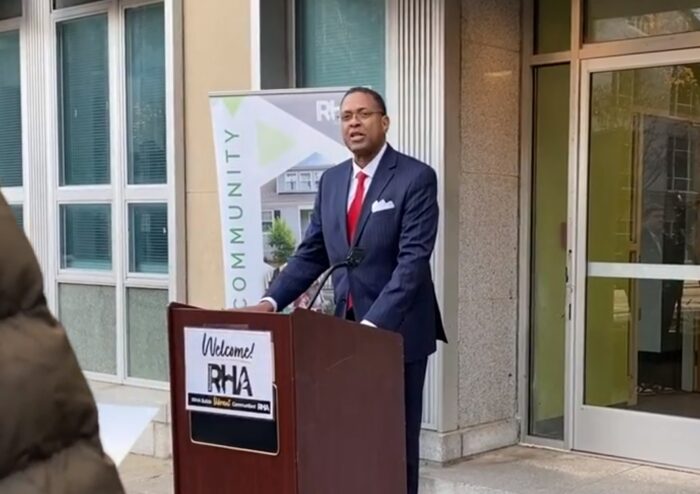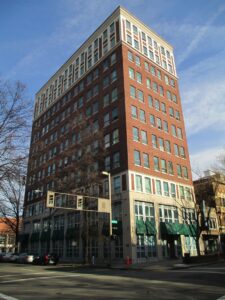With the building now empty after a Christmas Eve evacuation, Richmond’s public housing authority is preparing to overhaul the long-beleaguered Grace Place Apartments after it taking over only days earlier.
The Richmond Redevelopment & Housing Authority announced Dec. 20 that it had taken control of the apartments at 400 E. Grace St. after negotiating a deal with the building’s previous owner.
Four days later, the RRHA was forced to evacuate the building when a pipe burst flooded several apartments. The 11-story, 58-unit building at the corner of Grace and Fourth Street had been previously condemned and was forced to close temporarily earlier in the year due to health concerns and inspection issues.
While the building had become a gathering place for squatters and loiterers before the RRHA took it over, CEO Steven Nesmith said, the Christmas Eve evacuation affected 13 authorized residents – a dozen individuals and one family with children – who were relocated to an extended-stay hotel. Nesmith said staff has been meeting with those residents individually to determine needs and next steps.
With the building now vacant and a security force in place, Nesmith said the RRHA is starting the process to assess the building’s condition with the goal of restoring the apartments for use as public or lower-income housing.
“It’s going to be a total gutting of the entire building,” Nesmith said in an interview this week. “Our plan is to create affordable housing for that entire building for low- and moderate-income Richmond residents.”
Nesmith said the building was already in bad shape when the flooding occurred Dec. 24. He said it also had attracted squatters who were let into the building or found their own ways in, resulting in unsafe conditions and loitering around the building that he said was affecting businesses in the area.
“We had been getting comments from the businesses there in a two-block radius that the building had been attracting a lot of loiterers and people that were just hanging out, some of which were probably going in there to purchase drugs,” Nesmith said. “The business community was like, ‘This is not good for business,’ and it’s not good for people who are walking along the street who had to walk by the people there.”
Since joining the RRHA as CEO in October, Nesmith said he negotiated a deal for the RRHA to acquire the building by paying nearly $80,000 in back taxes owed by the previous owner, listed in property records as 400 East Grace Street LP. The entity is registered with the State Corporation Commission by Joseph Resende, president of Alexandria-based real estate agency Franklin Capital Group.
“He and I found a way to come to a negotiated settlement,” Nesmith said. “We bought the debt from Bank of America, and then we paid the back taxes and we became owner.”
The ownership change was recorded with the city Dec. 15, property records show. The city had assessed the century-old building, which was constructed in 1922, at $2.59 million.
While assisting the 13 residents who were displaced, Nesmith said the RRHA will be working to stabilize the building, remove mold and address other safety and structural concerns. Once that work is completed, he said it will be hiring an engineer and architect to conduct assessments of the building with the goal of returning it to its intended use.

Nesmith announced the acquisition in a press conference in front of the building on Dec. 20. (RRHA video screenshot)
He said units would be made available to both RRHA residents using Section 8 vouchers and the public at-large seeking lower-income housing.
“Our goal is to move people to self-sufficiency. It also helps us out when in some instances we have landlords who are not accepting Section 8 vouchers,” he said. “For people who are ready to move out of public housing and go to self-sufficiency, we can provide that opportunity for some of our public housing residents, and that also opens up units on our wait list and bring some other families who might need temporary housing.”
The building rehab will add to a busy workload for the RRHA. Earlier this year, it started work to convert its Creighton Court housing complex in the East End into more than 700 mixed-income units.
With the building now empty after a Christmas Eve evacuation, Richmond’s public housing authority is preparing to overhaul the long-beleaguered Grace Place Apartments after it taking over only days earlier.
The Richmond Redevelopment & Housing Authority announced Dec. 20 that it had taken control of the apartments at 400 E. Grace St. after negotiating a deal with the building’s previous owner.
Four days later, the RRHA was forced to evacuate the building when a pipe burst flooded several apartments. The 11-story, 58-unit building at the corner of Grace and Fourth Street had been previously condemned and was forced to close temporarily earlier in the year due to health concerns and inspection issues.
While the building had become a gathering place for squatters and loiterers before the RRHA took it over, CEO Steven Nesmith said, the Christmas Eve evacuation affected 13 authorized residents – a dozen individuals and one family with children – who were relocated to an extended-stay hotel. Nesmith said staff has been meeting with those residents individually to determine needs and next steps.
With the building now vacant and a security force in place, Nesmith said the RRHA is starting the process to assess the building’s condition with the goal of restoring the apartments for use as public or lower-income housing.
“It’s going to be a total gutting of the entire building,” Nesmith said in an interview this week. “Our plan is to create affordable housing for that entire building for low- and moderate-income Richmond residents.”
Nesmith said the building was already in bad shape when the flooding occurred Dec. 24. He said it also had attracted squatters who were let into the building or found their own ways in, resulting in unsafe conditions and loitering around the building that he said was affecting businesses in the area.
“We had been getting comments from the businesses there in a two-block radius that the building had been attracting a lot of loiterers and people that were just hanging out, some of which were probably going in there to purchase drugs,” Nesmith said. “The business community was like, ‘This is not good for business,’ and it’s not good for people who are walking along the street who had to walk by the people there.”
Since joining the RRHA as CEO in October, Nesmith said he negotiated a deal for the RRHA to acquire the building by paying nearly $80,000 in back taxes owed by the previous owner, listed in property records as 400 East Grace Street LP. The entity is registered with the State Corporation Commission by Joseph Resende, president of Alexandria-based real estate agency Franklin Capital Group.
“He and I found a way to come to a negotiated settlement,” Nesmith said. “We bought the debt from Bank of America, and then we paid the back taxes and we became owner.”
The ownership change was recorded with the city Dec. 15, property records show. The city had assessed the century-old building, which was constructed in 1922, at $2.59 million.
While assisting the 13 residents who were displaced, Nesmith said the RRHA will be working to stabilize the building, remove mold and address other safety and structural concerns. Once that work is completed, he said it will be hiring an engineer and architect to conduct assessments of the building with the goal of returning it to its intended use.

Nesmith announced the acquisition in a press conference in front of the building on Dec. 20. (RRHA video screenshot)
He said units would be made available to both RRHA residents using Section 8 vouchers and the public at-large seeking lower-income housing.
“Our goal is to move people to self-sufficiency. It also helps us out when in some instances we have landlords who are not accepting Section 8 vouchers,” he said. “For people who are ready to move out of public housing and go to self-sufficiency, we can provide that opportunity for some of our public housing residents, and that also opens up units on our wait list and bring some other families who might need temporary housing.”
The building rehab will add to a busy workload for the RRHA. Earlier this year, it started work to convert its Creighton Court housing complex in the East End into more than 700 mixed-income units.





“We bought the debt from Bank of America, and then we paid the back taxes and we became owner.”
And so . . . how much was the debt which RRHA assumed? And, in addition to the $80,000 in back taxes, what more, if any did RRHA pay?
I’m a proponent of tax rebates for property owners who lease to those who qualify along specific criteria. It’ll make it easier for developers and property owners to provide affordable housing for the working poor as well as the first responders, teachers etc. Best of all, it’ll distribute those affordable units throughout the city (and the whole region if the counties will participate), rather than grouping them all together, ala the Section 8 mistakes of the ‘70’s, which resulted in Mosby Court, Gilpen Court, etc., giving us instant ghettos.
I seriously doubt this will be anything like the 40’s-70’s project era. For starters, it’s located in downtown, not cut off from everything else or surrounded by other blight like the old projects are. And it’s not going to be 100% Section 8. This will help fill a drastic need in affordable housing in the city.